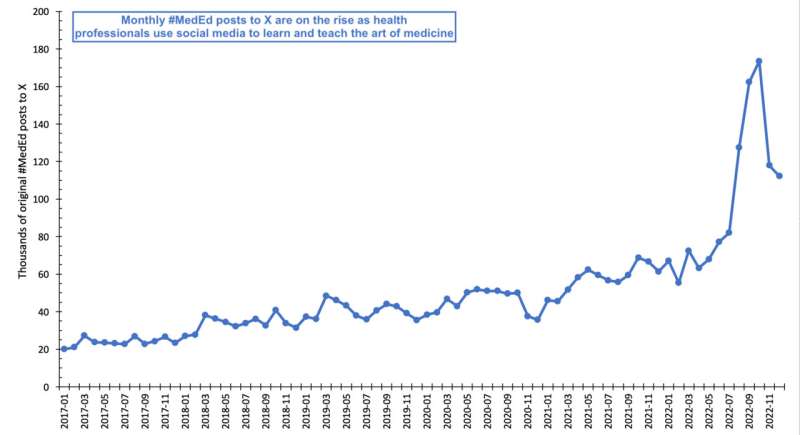This article has been reviewed according to Science X's editorial process and policies. Editors have highlighted the following attributes while ensuring the content's credibility:
fact-checked
peer-reviewed publication
trusted source
proofread
How doctors use social media to advance medicine

Ever wonder what your doctor is doing on social media? A new study, titled "#MedEd: Medical Education and Knowledge Translation on Social Media," published in JAMA led by John W. Ayers, Ph.D., from the Qualcomm Institute within the University of California San Diego, finds some physicians are harnessing the reach of social media to share and debate medical advancements.
The research team obtained all posts containing #MedEd made to X, formerly Twitter, from January 2012 through December 2022. There were 4,397,691 original posts with the hashtag #MedEd on X during this time. The number of posts increased each year, especially during the COVID-19 pandemic, most recently from 692,095 during 2021 to 1,178,647 during 2022.
"To put our findings into context, social media is the largest publisher of medical knowledge," said Ayers, who is vice chief of innovation in the Division of Infectious Disease and Global Public Health at UC San Diego School of Medicine in addition to his Qualcomm Institute affiliation. "Unlike traditional knowledge resources that are kept in medical schools or paywalled, social media harnesses the collective wisdom and insights of millions of doctors transparently."
Harnessing #MedEd to accelerate medical science and improve practice
"Social media has been the subject of intense scrutiny, particularly concerns over misinformation; however, for health professionals like myself, social media is incredibly valuable for staying up to date on the latest medical advancements," said Aaron Goodman, M.D., an associate clinical professor at UC San Diego School of Medicine and study co-author, who goes by the moniker Papa Heme on X, where he shares content on oncology and hematology to his 127,000+ mostly physician followers.
"New medical knowledge is often nuanced, and well-informed people can have valid, differing opinions on the same data," added physician-scientist and study co-author Davey Smith, M.D., chief of the Division of Infectious Disease and Global Public Health at UC San Diego School of Medicine and co-director of the university's Altman Clinical and Translational Research Institute. "Social media is a way to rapidly disseminate such information and provide a platform to robustly debate the veracity of such new knowledge."
"The potential for #MedEd to improve medical education is considerable, but the risks of dismissing #MedEd is potentially greater," continued Smith. "Our study suggests now is time to invest more resources into #MedEd to unite the tens of millions of health professionals across the globe in continuous learning and teaching."
More information: #MedEd: Medical Education and Knowledge Translation on Social Media, JAMA (2023). DOI: 10.1001/jama.2023.12465





















